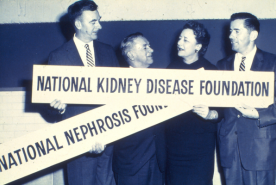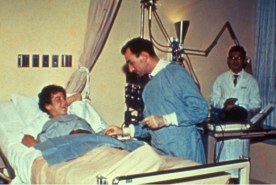February 10, 2022
Donating a kidney to a friend or family member is a huge life decision. It's natural to hope that giving this gift will help your relationship with the donor but should not be a reason for donating. Why? It's impossible to predict the future; people and circumstances change. Sometimes, the relationship between donor and recipient doesn't strengthen at all, gets worse, or breaks apart entirely. You'll need to consider uncomfortable possibilities before deciding to donate.
It does happen
@colleeeniie if younger me was in a bad mood:
♬ original sound - .
In a recent example, Colleen Le took to TikTok to reveal that she gave her kidney to a boyfriend who betrayed her and left her a few months after the surgery. Her videos garnered millions of views, national media attention, and public scorn for the dishonest boyfriend. But the success of her videos aside, the hurt caused by such betrayal can be difficult to deal with for the donor. If this happens to you, you won't have to go through this alone. The staff at the transplant center are there to help guide you through the process.
Deciding to donate
If you're thinking about donating your kidney, you will first undergo a rigorous evaluation to ensure you are physically, financially, and emotionally healthy enough to do so. This process does its best to share different possible outcomes of the surgery, both positive and negative, to help you make the most informed decision possible.
Financial consultation: Staff at your transplant center will ask about your finances and insurance coverage. In general, if you donate to a family member or friend, the recipient's insurance will pay your expenses for testing and surgery. However, you may be responsible for travel expenses, lost wages, and some follow-up care.
Medical evaluation: Staff will discuss your medical history, physically examine you, and conduct several tests to ensure you are physically well enough to donate a kidney. During this evaluation, the team will also make sure you are compatible with the recipient. If not, you may participate in a "paired exchange," where you swap recipients with another incompatible donor.
Psychological evaluation: The transplant team will evaluate your mental health, make sure you understand the donation process, and ensure there is no pressure or financial incentives. They'll also make sure your expectations are realistic and fully informed - this includes your expectations about your relationship with the recipient.
Learn more about the evaluation process.
Preparing for undesired outcomes
You may hope for a better relationship with the recipient or dislike how they treat their body after the surgery. The transplant team will help you delve into your emotions, hopes, and expectations during the evaluation. However, they can only do this if you are completely honest with them, and more importantly, yourself. This can be extremely difficult, so we’ve put together a list of questions to help guide you. Answer them as honestly as possible to get the most benefit from them.
- Why do I want to donate my organ to someone else?
- Am I expecting anything in return for my donation? (For example, am I hoping for attention, gratitude, a better relationship with the recipient, or other things?) If so, how will I feel if I do not get these things?
- How will I feel if the recipient is not grateful in the way I imagined?
- How will I feel if the recipient doesn't take care of my donated organ after receiving it?
- How will I be able to cope if my relationship with the recipient becomes strained or difficult?
Changing your mind
You can change your mind about donating a kidney at any point during the process. The decision has to be completely voluntary and free from any pressure. If you aren't 100% confident you can give this gift without strings attached, it isn't in anyone's best interest to go through the process. If you need assistance in declining the donation, your transplant team can help you.
Finding a silver lining
We don't want to downplay the significant pain of losing a relationship, but we would like to highlight one silver lining. Regardless of the relationship outcome, your gift has given someone you cared about a chance to live a longer, healthier life. That is truly something to be proud of and a sentiment that Colleen has taken to heart.
During an interview with Insider, she said,
"I saved someone's life, and I can't take that back, so I don't regret what I did at all," she said. "I heard from some of our friends that he got married, so I'm happy for him. And I only wish him the best."
Support is available
Are you struggling with the decision to donate? Have you donated and experienced the relationship break apart? Help is out there. Through the NKF Peers program, we can match you with a trained mentor who has been in your shoes. Sometimes the best advice comes from those who have been there too.


















